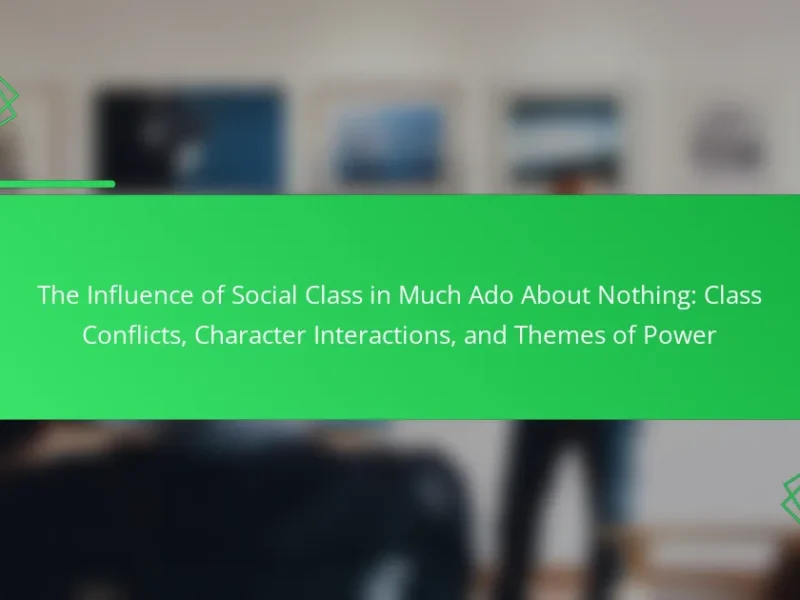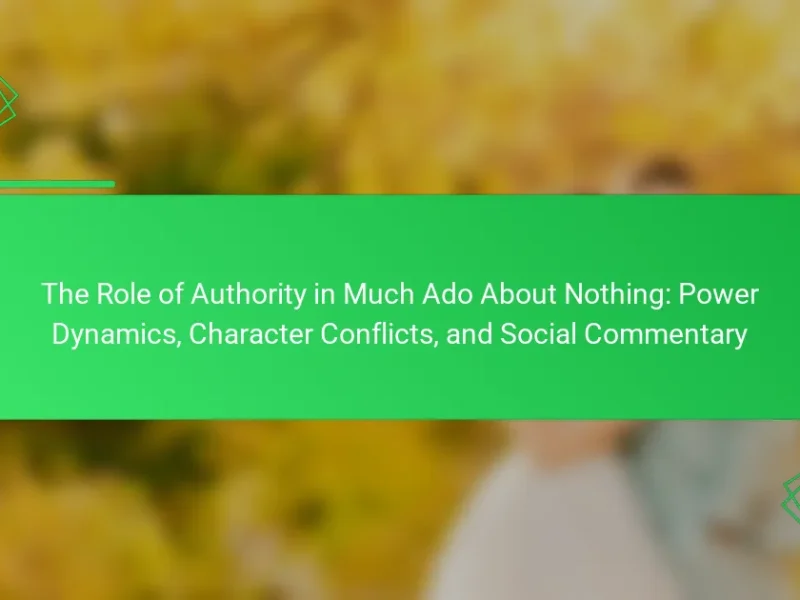
What are the key themes of marriage in Much Ado About Nothing?
The key themes of marriage in Much Ado About Nothing include love, deception, and social expectations. Love is depicted as both a source of joy and conflict. Characters like Benedick and Beatrice showcase the complexities of romantic relationships. Deception plays a crucial role, as misunderstandings and tricks influence relationships. Claudio’s public shaming of Hero highlights the fragility of reputation in marriage. Social expectations dictate behavior and relationships, often leading to conflict. The resolution of these conflicts emphasizes forgiveness and reconciliation. Ultimately, the play presents marriage as a complex interplay of love, trust, and societal pressures.
How do expectations shape the characters’ views on marriage?
Expectations significantly influence the characters’ views on marriage in Much Ado About Nothing. Characters like Claudio and Hero have traditional expectations of romantic love and fidelity. Claudio’s expectations lead him to doubt Hero’s loyalty, resulting in public shaming. Conversely, Beatrice and Benedick challenge societal expectations by valuing wit and companionship over conventional romance. Their evolving relationship reflects a more modern view of partnership. These contrasting expectations create conflict and drive the narrative. Ultimately, the resolution of these conflicts showcases the characters’ growth and a nuanced understanding of marriage.
What societal norms influence these expectations?
Societal norms that influence expectations in marriage include gender roles, social status, and family honor. Gender roles dictate that men are providers while women are caretakers. These roles shape how individuals perceive their responsibilities within a marriage. Social status impacts marriage expectations, where class differences affect compatibility and desirability. Family honor plays a crucial role; marriages are often seen as reflections of family reputation. In Elizabethan society, the union of two families could elevate or diminish social standing. These norms create pressures that dictate behavior and choices in relationships.
How do individual desires conflict with societal expectations?
Individual desires often conflict with societal expectations due to differing priorities. Individuals may seek personal happiness, love, or autonomy. Societal expectations, however, emphasize conformity, tradition, and duty. For example, in “Much Ado About Nothing,” characters like Beatrice and Benedick desire genuine love. Their desires clash with societal norms advocating arranged marriages. This conflict illustrates the tension between personal fulfillment and social obligation. Ultimately, characters navigate these challenges to find resolutions that balance their desires with societal pressures.
What conflicts arise from the exploration of marriage?
Conflicts arising from the exploration of marriage include societal expectations and personal desires. Characters in “Much Ado About Nothing” face pressure to conform to traditional roles. This pressure often leads to misunderstandings and deception. For instance, Claudio’s public shaming of Hero stems from his expectations of fidelity. Additionally, Beatrice and Benedick’s relationship challenges societal norms. Their witty banter highlights the conflict between individual choice and social obligation. Ultimately, these conflicts reveal deeper themes of trust and communication within marriage.
What misunderstandings impact the relationships in the play?
Misunderstandings significantly impact the relationships in Much Ado About Nothing. Key misunderstandings include mistaken identities and miscommunication. For example, Claudio’s belief that Hero is unfaithful stems from Don John’s deception. This misunderstanding leads to public shaming and a rift between Claudio and Hero. Additionally, Benedick and Beatrice’s relationship suffers from their pride and misinterpretations of each other’s feelings. Their friends’ scheming further complicates their perceptions. These misunderstandings create conflict but also pave the way for eventual resolutions and reconciliations.
How do jealousy and deception contribute to conflict?
Jealousy and deception significantly contribute to conflict by creating mistrust and misunderstandings. Jealousy often leads individuals to suspect infidelity or betrayal. This suspicion can escalate into accusations and hostility. Deception, such as lying or withholding information, further complicates relationships. It can cause partners to feel betrayed when the truth is revealed. In “Much Ado About Nothing,” these themes are evident in the interactions between characters. For example, Claudio’s jealousy over Don Pedro’s perceived interest in Hero leads to public humiliation. This act of deception and jealousy ignites conflict among the characters. The resulting misunderstandings create a rift that impacts their relationships. Thus, jealousy and deception act as catalysts for conflict in both personal and social dynamics.
What resolutions are presented regarding marriage in the play?
The resolutions presented regarding marriage in the play include reconciliation and understanding between couples. Claudio and Hero’s relationship resolves through forgiveness after misunderstandings. Benedick and Beatrice’s union highlights mutual respect and love. The play emphasizes the importance of communication in resolving conflicts. These resolutions reflect the characters’ growth and the restoration of social harmony. The conclusion showcases marriage as a source of joy and stability.
How do the characters resolve their conflicts?
The characters in Much Ado About Nothing resolve their conflicts through communication and reconciliation. For example, Beatrice and Benedick confront their misunderstandings directly. They express their feelings openly, leading to mutual understanding. Claudio and Hero resolve their conflict after a public shaming incident. Hero’s faked death prompts Claudio to realize his mistakes. The intervention of friends and family also plays a crucial role. They help mediate disputes and encourage forgiveness. Ultimately, love triumphs as characters choose to forgive and rebuild relationships. This resolution reflects the play’s themes of trust and redemption in marriage.
What role does forgiveness play in the resolution of marital issues?
Forgiveness plays a critical role in resolving marital issues. It allows couples to move past grievances and rebuild trust. When one partner forgives, it can reduce resentment and promote healing. Studies show that forgiveness is linked to improved relationship satisfaction. For example, research by Worthington et al. indicates that forgiveness is essential for conflict resolution in marriages. This process fosters emotional connection and enhances communication. Ultimately, forgiveness can lead to stronger, more resilient partnerships.

How does Much Ado About Nothing reflect the nature of love and marriage?
Much Ado About Nothing reflects the nature of love and marriage through its exploration of various relationships. The play presents contrasting views on love, such as romantic love and friendship. The relationship between Beatrice and Benedick showcases witty banter and mutual respect. Their eventual union illustrates the importance of compatibility and understanding in marriage. In contrast, Claudio and Hero’s relationship highlights themes of trust and societal expectations. Their conflict arises from misunderstandings, reflecting the fragility of love. Ultimately, the play suggests that love requires both honesty and communication. These dynamics reveal the complexities of marriage in a social context.
What types of love are depicted in the relationships?
The types of love depicted in the relationships of “Much Ado About Nothing” include romantic love, familial love, and platonic love. Romantic love is primarily illustrated through the relationships of Benedick and Beatrice, as well as Claudio and Hero. Their interactions showcase passion and desire, often intertwined with conflict and misunderstanding. Familial love is evident in the bond between Hero and her father, Leonato, highlighting themes of loyalty and honor. Platonic love is portrayed through the friendship between Benedick and Claudio, emphasizing camaraderie and support. Each type of love contributes to the play’s exploration of marriage and relationships, revealing complexities and challenges faced by the characters.
How do romantic and platonic relationships differ in the play?
Romantic and platonic relationships in the play differ primarily in their emotional depth and intentions. Romantic relationships are characterized by love, passion, and often a desire for physical intimacy. In contrast, platonic relationships are based on friendship without romantic or [censured] interests. For example, the relationship between Beatrice and Benedick evolves from a playful rivalry to a deeper romantic connection. Meanwhile, the friendship between Beatrice and Hero remains supportive and non-romantic throughout the play. This distinction highlights the varied expectations and conflicts that arise in different types of relationships.
What role does friendship play in the context of marriage?
Friendship plays a crucial role in the context of marriage. It fosters emotional intimacy and trust between partners. Strong friendships within a marriage enhance communication and understanding. They provide support during conflicts and challenges. Research indicates that couples who view each other as friends report higher satisfaction levels. Friendship encourages shared activities and interests, strengthening the bond. In “Much Ado About Nothing,” the friendship between Beatrice and Benedick illustrates this dynamic. Their playful banter evolves into a deep emotional connection, highlighting the importance of friendship in marital relationships.
How do the characters’ personal growth influence their views on marriage?
The characters’ personal growth significantly influences their views on marriage. For instance, Beatrice evolves from a cynical view of relationships to embracing love and partnership. Her initial skepticism stems from past experiences and societal norms. As she grows, she learns to value emotional connection over independence. Benedick similarly transforms; he shifts from a commitment-averse bachelor to a devoted partner. His journey reflects a deeper understanding of vulnerability and companionship. Claudio’s growth reveals a transition from idealized notions of love to recognizing the complexities of trust and communication. Each character’s development reshapes their perspectives, highlighting that personal growth fosters a more nuanced understanding of marriage. This transformation underscores the play’s themes of love, trust, and the importance of mutual respect in relationships.
What transformations do the main characters undergo?
The main characters in Much Ado About Nothing undergo significant transformations in their relationships and personal growth. For example, Beatrice evolves from a witty, independent woman to someone who embraces love and vulnerability. Benedick transitions from a self-proclaimed bachelor to a devoted partner, willing to commit. Claudio experiences a shift from infatuation to deep regret and maturity after falsely accusing Hero. Hero transforms from a passive character to one who asserts her strength and dignity after being wronged. These transformations highlight the themes of love, trust, and redemption within the narrative. Each character’s journey reflects the complexities of marriage and the potential for personal change through love and conflict.
How does self-awareness impact their relationships?
Self-awareness significantly enhances relationships by fostering better communication and understanding. Individuals who are self-aware can recognize their emotions and reactions. This recognition allows them to express their feelings more clearly. Consequently, partners can engage in more meaningful conversations. Self-awareness also aids in identifying personal strengths and weaknesses. Understanding these aspects can lead to greater empathy towards others. Research shows that self-aware individuals tend to have healthier relationships. A study published in the Journal of Personality and Social Psychology indicates that self-awareness correlates with relationship satisfaction. Therefore, self-awareness is essential for nurturing and maintaining strong relationships.

What lessons can be learned from the exploration of marriage in Much Ado About Nothing?
The exploration of marriage in Much Ado About Nothing teaches several key lessons. First, it highlights the importance of communication in relationships. Misunderstandings lead to conflict, as seen with Claudio and Hero. Second, the play illustrates that love can be complicated by societal expectations. Characters navigate honor and reputation, impacting their relationships. Third, it emphasizes the value of trust and loyalty. Betrayals cause significant turmoil, particularly in Claudio’s treatment of Hero. Lastly, the play suggests that true love requires patience and forgiveness. Benedick and Beatrice’s relationship evolves, demonstrating growth and mutual respect. These lessons reflect the complexities of marriage and relationships in society.
What are the key takeaways regarding expectations in relationships?
Key takeaways regarding expectations in relationships include the importance of clear communication and mutual understanding. Establishing expectations helps prevent misunderstandings. Expectations can shape relationship dynamics significantly. Unrealistic expectations often lead to disappointment and conflict. Flexibility in expectations can enhance relationship satisfaction. Acknowledging individual differences is crucial in managing expectations. Regularly revisiting expectations fosters growth and adaptation in relationships. Research indicates that couples who communicate their expectations effectively report higher relationship satisfaction.
How can understanding societal norms improve personal relationships?
Understanding societal norms can significantly enhance personal relationships. Societal norms dictate acceptable behaviors and expectations in interactions. Recognizing these norms helps individuals navigate social situations more effectively. For example, knowing the importance of respect and communication can foster trust. When individuals align their actions with societal expectations, conflicts often decrease. A study by the American Psychological Association found that understanding social cues improves relationship satisfaction. Thus, awareness of societal norms leads to stronger interpersonal connections.
What strategies can couples use to navigate conflicts in marriage?
Couples can use several strategies to navigate conflicts in marriage. Effective communication is essential. It allows both partners to express their thoughts and feelings clearly. Active listening helps partners understand each other’s perspectives. Setting aside time for discussions can prevent misunderstandings. Using “I” statements promotes ownership of feelings without blaming the other. Compromise is crucial; both partners should be willing to give and take. Seeking professional help, such as couples therapy, can provide additional tools. Research shows that couples who engage in conflict resolution strategies have higher satisfaction rates in their marriages. These strategies contribute to healthier relationships and better conflict management.
How can communication help resolve misunderstandings?
Communication can help resolve misunderstandings by clarifying intentions and reducing assumptions. Effective communication allows individuals to express their thoughts and feelings openly. This exchange of information fosters mutual understanding. When parties articulate their perspectives, they can identify the root of the misunderstanding. Listening actively is crucial in this process. It ensures that all viewpoints are acknowledged and considered. Research shows that clear communication decreases conflict and promotes resolution. For instance, studies indicate that couples who communicate effectively report higher relationship satisfaction. Therefore, communication serves as a vital tool in resolving misunderstandings.
What role does empathy play in conflict resolution?
Empathy plays a crucial role in conflict resolution by fostering understanding among conflicting parties. It allows individuals to recognize and appreciate each other’s feelings and perspectives. This recognition can de-escalate tensions and open pathways for dialogue. Empirical studies show that empathetic communication leads to more effective conflict management. For instance, a study published in the Journal of Conflict Resolution found that empathy significantly reduces hostility during disputes. By promoting a collaborative atmosphere, empathy encourages parties to find mutually acceptable solutions.
The primary entity of this article is marriage as depicted in Shakespeare’s Much Ado About Nothing. The article explores key themes such as love, deception, and social expectations that shape characters’ views on marriage. It examines how societal norms influence relationships, the conflicts arising from individual desires versus societal expectations, and the role of misunderstandings, jealousy, and deception in creating tension. Additionally, it highlights resolutions through communication, forgiveness, and personal growth, illustrating the complexities of marriage and the lessons learned regarding expectations and conflict management.


